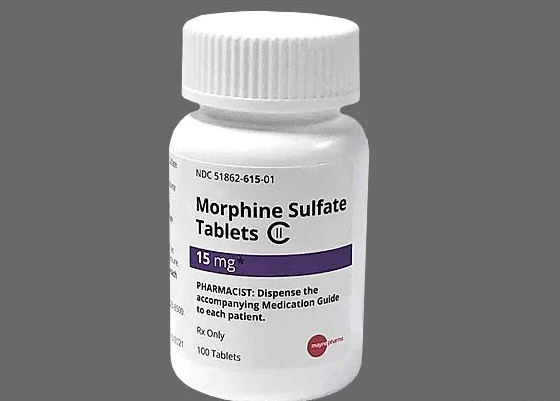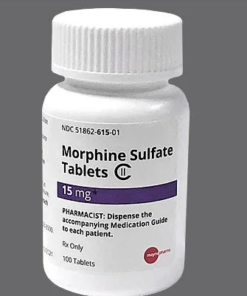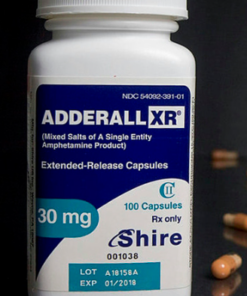What is morphine?
Morphine is an opioid medication used to relieve pain when non-opioid medications don’t provide enough pain relief. Depending on the form, it can be used to control sudden pain quickly or more long-lasting (chronic) pain. Taking morphine for a long period of time can become habit-forming, and people can have bothersome symptoms if the medication is stopped suddenly.
How morphine works
Morphine is an opioid medication. It binds to certain parts of your brain, called mu-opioid receptors, to change how you react to pain. This helps lower how much pain you feel.
What is morphine used for?
- Pain that isn’t relieved by non-opioid medications
Typical dosing for morphine
Your healthcare provider will work with you to find the right dose and regimen for you to control your pain.
Immediate-release:
- The typical starting dose for the tablets is 15 mg to 30 mg by mouth every 4 hours on an as-needed basis for quick relief of sudden pain (breakthrough pain).
- The typical starting dose for the liquid form is 10 mg to 20 mg by mouth every 4 hours as needed for breakthrough pain.
- The typical starting dose for the suppositories is 10 mg to 20 mg inserted into your rectum every 4 hours as needed for breakthrough pain.
What are the side effects of morphine?
With any medication, there are risks and benefits. Even if the medication is working, you may experience some unwanted side effects.

- Slowed breathing
- Overdose: not responding to sound or touch, slowed breathing, slow heartbeat, small pupils the size of a pinhead, extreme sleepiness, pale, blue, or cold or clammy skin
- Withdrawal: restlessness, runny nose, yawning, sweating, chills, widened pupils, irritability, anxiety, suicidal thoughts
The following side effects may get better over time as your body gets used to the medication. Let your doctor know immediately if you continue to experience these symptoms or if they worsen over time.
Common side effects
- Constipation
- Nausea
- Vomiting
- Sleepiness
- Lightheadedness
- Dizziness
- Sweating
Other side effects
- Slowed breathing
- Changes in heartbeat
- Changes in blood pressure
- Fainting
- Heartburn
- Trouble swallowing
- Anemia (low red blood cell count)
- Low platelets
- Swelling of the hands or ankles
- Weight loss
- Unusual dreams
- Agitation
- Memory loss
- Anxiety
- Confusion
- Depression
- Extreme happiness
- Nervousness
- Headache
- Dry skin
- Itchiness
- Abnormal ejaculation
- Pain while urinating
- Lowered sex drive
- Changes in frequency of urination
What are the risks and warnings for morphine?
Morphine can cause some serious health issues. This risk may be even higher for certain groups. If this worries you, talk to your doctor or pharmacist about other options
Potential for addiction, abuse, and misuse
- Risk factors: Personal or family history of substance or alcohol abuse | History of mental health conditions

The FDA requires a Risk Evaluation and Mitigation Strategy (REMS) program for morphine because of the high risk of addiction, abuse, and misuse. Under the REMS program, your healthcare provider will go over how to use morphine safely, what its risks are, and the proper storage and disposal of the medication to help keep you and your loved ones safe. If you have concerns about taking morphine, talk to your provider about other treatment options for pain.
Potentially life-threatening slowed breathing (respiratory depression)
- Risk factors: Age 65 years or older | People who are very weak | Chronic obstructive pulmonary disease (COPD) | Taking sedatives or other medications that can cause respiratory depression | Conditions that cause respiratory depression | Taking high doses of morphine

Overdose
- Risk factors: History of opioid use disorder | Previous opioid overdose | Taking sedatives or other medications that can cause slowed breathing or heartbeat | Alcohol use | Taking high opioid doses | Taking more opioids than prescribed | Age 65 years or older | Age 18 years or younger

Overdose symptoms include extremely slowed breathing, slow heartbeat, extreme sleepiness, cold or clammy skin, or not responding to sound or touch. Call 911 right away if you think an overdose has happened. Your healthcare provider might prescribe naloxone (Narcan), a medication used to reverse life-threatening opioid overdose. It’s important for you and your caregiver to know how to use naloxone (Narcan) in case an accidental overdose happens.
Harm to newborn babies
- Risk factors: Long-term use during pregnancy

Difficulty concentrating and extreme sleepiness
- Risk factors: Age 65 years or older | Taking other medications that make you less alert or slow your body down | Alcohol use
Morphine can cause extreme sleepiness and lower your ability to think, react, and focus. Alcohol and other medications, like benzodiazepines, sedatives, anxiety medications, and certain muscle relaxants, can make you feel even worse. It’s best to avoid drinking alcohol or taking these medications while taking morphine. Make sure you know how this medication affects you before driving a car or doing activities that require your concentration. Talk to your healthcare provider right away if you feel too sleepy from taking morphine.
Physical dependence and withdrawal
- Risk factors: Long-term use of morphine
If taken regularly for a long time, morphine can cause physical dependence and tolerance. This means your body relies on the medication to function and that you might need higher doses to get the same pain relief. You might experience withdrawal if you stop taking the medication suddenly. Withdrawal symptoms include restlessness, runny nose, yawning, sweating, chills, wide pupils, irritability, anxiety, uncontrolled pain, and suicidal thoughts. Don’t lower your dose or stop taking the medication suddenly without talking to your healthcare provider. Your provider will slowly lower your dose to prevent withdrawal symptoms. If you have concerns about taking the medication because of this risk, talk to your healthcare provider about alternative pain medications.
Low hormone levels
Opioids can cause your hormone levels to drop. This is more likely to happen if you take the medication longer than a month. Symptoms of very low hormone levels include nausea, vomiting, loss of appetite, tiredness, dizziness, and weakness. Let your healthcare provider know right away if you experience these symptoms.
Low blood pressure
- Risk factors: Age 65 years or older | Taking other medications that lower blood pressure or slow your body down | Dehydration
Morphine can cause extremely low blood pressure, including a drop in blood pressure when you stand from a sitting or lying down position. This can lead to dizziness and fainting. To avoid falling, get up slowly if you’ve been sitting or lying down. If dizziness or lightheadedness doesn’t go away, talk to your healthcare provider.
Seizures
- Risk factors: History of seizure conditions
Opioids can cause more frequent seizures in people who’ve had seizures in the past or in other situations where seizures can occur. Let your healthcare provider know if you have seizures more often while taking morphine.
| Quantity | 60 tablets, 100 tablets, 150 tablets, 200 tablets, 500 tablets |
|---|
Be the first to review “Morphine 15mg” Cancel reply
Related products
Uncategorized
Uncategorized
Uncategorized
Uncategorized
Uncategorized
Uncategorized
Uncategorized
Uncategorized






















Reviews
There are no reviews yet.